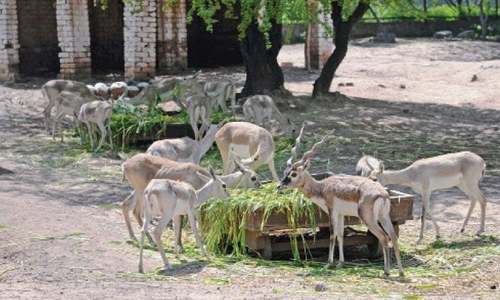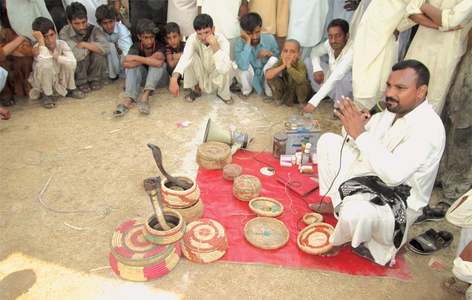KARACHI: A recent study, compiled through undercover surveys of 55 markets in 23 cities across Pakistan, has revealed that a majority of species/animal derivatives on sale at these markets are listed within the Convention on International Trade in Endangered Species and the International Union for the Conservation of Nature’s Red List of threatened species.
The study found that Karachi hosted the highest number of markets and shops dealing in illegal wildlife followed by Peshawar. Consumption of dried meat of the Indian cobra and sand lizard is recorded to be widespread in Khyber Pakhtunkhwa and Punjab.
Titled An assessment of the scale of illegal wildlife trade in Pakistan, the study was conducted by the World Wide Fund for Nature-Pakistan (WWF-P) and authored by Dr Uzma Khan and Hamera Aisha.
‘Karachi has highest number of markets and shops dealing in illegal wildlife followed by Peshawar’
Part of a project supported by USAID, the study aimed at assessing the scale of illegal wildlife trade in Pakistan and looked into the effectiveness of the existing wildlife regulations.
The study covered a total of 288 shops and street vendors in 55 markets dealing in wildlife and their derivatives. These markets were located in Karachi, Thatta, Kashmore, Ghotki, Sukkur, Nagarparkar, Lahore, Dera Ghazi Khan, Rawalpindi, Islamabad, Gujranwala, Mianwali, Murree, Multan, Abbottabad, Chitral, Mardan, Mansehra, Peshawar, Gilgit, Muzaffarabad, Gawadar and Jiwani.
All surveyed markets and shops were found to be involved in illegal wildlife trade. The study didn’t cover legal pet trade.
High return crime
Illegal trade of wildlife species was predominantly recorded in bigger metropolises such as Lahore and Karachi, where the demand for exotic pets was found higher than other cities.
In Karachi, 12 markets and 42 shops were identified dealing in illegal wildlife, whereas, in Peshawar seven markets and 33 shops were recorded to be involved in this illegal trade.
The survey teams did not find any wildlife markets in Islamabad, Gwadar, Jiwani, Murree or Nagarparkar districts.
The teams recorded 55 wildlife species on sale in markets surveyed across the country, of which 40 per cent comprised mammals, 39pc birds, 19pc reptiles, while the remaining 2pc belonged to the invertebrates (Arachnida) category.
Mammal species recorded during the course of the survey included the leopard cat, Indian palm civet, Pallas cat, chinkara, hog deer, grey langur, Asiatic jackal, Indian pangolin, rhesus monkey etc. Whereas, the common leopard and Himalayan black bear cubs were also available for sale within a time period of 14 days upon an advance payment of 50pc.
A number of bird species caught in the wild were observed in markets. But, (for the purpose of this study) only protected species and those high in trade demand were recorded.

“In Lahore, Karachi, Abbottabad and Mansehra shops were observed to have catalogues with pictures of animals and their price tags. Whereas, in the province of Sindh and Punjab it was also observed that shopkeepers kept short video clips of captured animals in their mobile phones for customers.
“In Lahore’s Tolington Market, researchers were escorted by shop owners to a small, dingy shop where animals were kept in small cages and in a deplorable state of neglect,” it says.
Wildlife derivatives
The survey team recorded the use of derivatives of 12 mammals, five reptiles and one bird and invertebrate species as the key ingredient in traditional medicines available with street vendors and local herbalists.
These medicines are commonly sold as ointments and are believed to have aphrodisiac properties and to provide relief in joint and muscular pain.
Traditional medicines containing pelican fat were recorded in Sukkur, Ghotki, Kashmore and parts of Balochistan where local herbalists converted it into oil to treat several diseases, including fever and muscular pain.
The forms in which animal derivatives were sold include oils, which contained fat or bile extracts, meat (both fresh and dried) and bones. Fat extracts of the Indian spiny tailed lizard, Asiatic black bear, Asiatic lion and tiger were commonly found in traditional medicines.
Survey teams found the meat of Indian pangolins, Indian crested porcupines and freshwater turtles on sale in several cities. This meat was meant to be used in traditional medicine or smuggled to East Asian countries.
Markets in Sindh, Punjab and Khyber Pakhtunkhwa were found selling wildlife pelts and fur.
“Specifically, the cities of Karachi, Sukkur, Multan, Dera Ghazi Khan and Lahore had widespread pelt and fur trade.
Pelts of the common leopard, African lion (exotic species), Indian palm civet, jungle cat, and leopard cat were available at high prices in markets where local herbalists were mostly found,” the study says.
According to 50pc of respondents, the study says, wildlife derivatives were sourced in the wild through traders in Karachi and Azad Jammu and Kashmir. A total of 30pc claimed to have bought animals through salesmen.
Online illegal trade
“Around 10 per cent of herbalists confirmed getting animal fat and other derivatives from the staff of provincial wildlife departments. Whereas, remnants of circus animals and smuggled animal products together add up to five per cent of animal derivatives found in markets,” it says.
The study also points out that that neither the wildlife nor the police department was found to have any monitoring facility in these markets.
The study found that illegal wildlife trade conducted through websites extended to a large range of cities and provinces.
Punjab had the largest share of trade with 13 cities involved, mainly in Lahore and Rawalpindi. Sindh had the second largest proportion of online trade, predominantly in Karachi.
“All corners of Pakistan are involved in illegal wildlife trade as traders selling items exist in all provinces. Traders in Balochistan advertised their wares in five different cities. The Azad Jammu and Kashmir had traders located in three cities and Khyber Pakhtunkhwa had vendors in three cities. Gilgit-Baltistan also had a trader in Hunza,” the study says.
Published in Dawn, March 12th, 2018














































